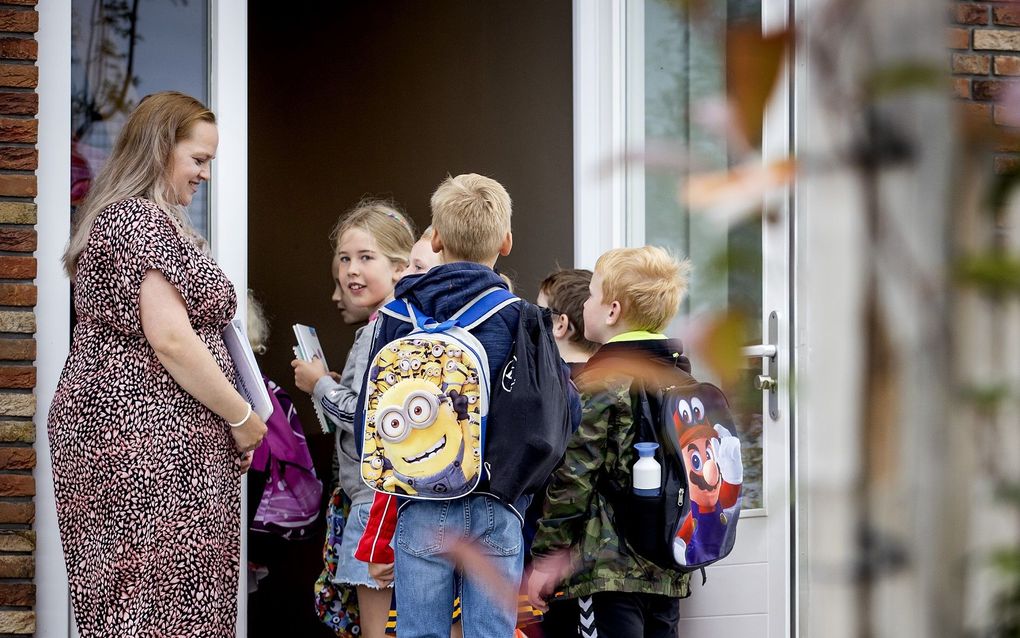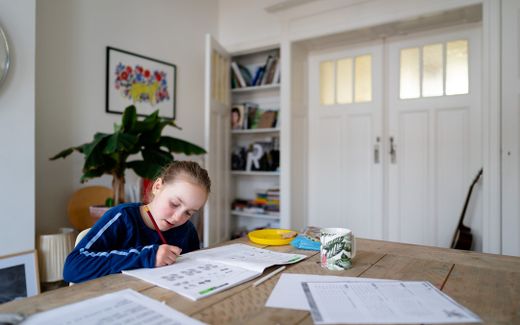Is the Biblical image of man the same as the psychological picture?
12-04-2022
Christian Life
Linda den Hollander, RD

Primary school in The Netherlands. Photo ANP, Koen van Weel
Christian Life
Getting the best out of yourself. Becoming who you really are. Developing your core qualities. All this positive psychology has penetrated Christian schools also. There it causes friction with the convictions of some teachers.
Is it Biblical to teach students that they have to develop themselves maximally while God's Word calls for self-denial? May a teacher call a child a champion, while at the same time he confesses that every human is prone to evil? Petronelle Baarda, theologian and psychologist, wrote a PhD thesis about the relationship between positive psychology and a Christian worldview.
What was your research exactly about?
"My thesis is about the ratio between positive psychology and theology – focused on Christian education. I analyse what teachers find important in the flourishment of their students and how they connect that view to their Christian conviction."
Flourishment is a keyword in your research. What do you mean by that?
"Our society focuses strongly on self-development. Only if you stay close to who you are you can become happy. That is the central idea of positive psychology. The goal of this way of thinking is to let people thrive. In other words: to let them flourish.
But it is not easy to tell when someone flourishes. Positive psychology says: One thrives when he feels good and functions well. The theology says: One flourishes if he lives in good relation to God."
What does the Christian teacher say about that?
"To discover that opinion, I talked to thirteen teachers of Christian or Reformed primary schools. From these conversations, I concluded that they have four ideals. First, their longing is for children to get to know God. Second, for them to know how to deal with others in a good and compassionate way. Third, for the children to behave in a right and honest manner. And last, for them to know who they are and live in self-confidence."
To what extent do teachers connect these ideals with the Christian faith?
"That does not happen very deeply. Generally, known Biblical arguments, such as love for the neighbour and compassion, are meant. But active reflection on these values is lacking. Therefore, there is no overall theological view on how students' social-emotional education fits within the school's identity."
You conclude that there is a dualistic view of man in Christian education. What do you mean by that?
"Teachers find it essential to incorporate the school's identity in everything. But that does not happen sufficiently in the pedagogical area. For example, teachers offer training to overcome the fear of failure and make students emotionally stronger. But during these sessions, they do not refer to the Bible very often. In essence, we teach children to solve their fear without God. At the same time, Bible texts such as "Be careful in nothing" are very applicable to this theme."
Teachers find it very complex to use words like autonomy and self-confidence in a way that is in line with the school's identity, you say.
"That is correct. Language makes people attentive. In church, the word 'autonomy' often means determining your own law. And concerning self-confidence, the Bible teaches us that we cannot trust ourselves. A respondent told me, for example, that he rather uses the word 'realisation of talent' for that reason."
How do teachers apply the term 'sin' in their pedagogy?
"They acknowledge that we live in a broken world and recognise sin in the behaviour of their students. They see how the children bully one another, throw away their food and do not listen. However, it is remarkable that teachers are hesitant to mention the term sin in such concrete situations. They think, for example, that concretely mentioning sin can lead to low self-esteem of their students. Teachers say they are afraid that they 'destroy' things with the Bible.
From a pedagogical point of view, I understand these objections. At the same time: if sin does not get a concrete meaning in the lives of children, what then is the value of grace? That sort of questions needs to be thought about more."
What kind of homework does your thesis give to teachers?
"It is important for teachers, school boards and theologians to think more actively about the relation between school identity and the use of positive psychological interventions. The identity is not only visible in the day opening or the school books, but also in the pedagogy of the teacher."
What gives you hope?
"Teachers want to immerse their education and upbringing with the Christian identity. They just do not know-how. There is not enough time and sometimes not enough of a theological foundation either. But I find it very good that they do have the longing."
Petronelle Baarda

Dr P.D. (Petronelle) Baarda (1979), from the Dutch town of Zeist, studied psychology at the Free University Amsterdam (1999-2004). She is specialised in child and youth psychology. Next, she studied theology at the Theological University Apeldoorn (TUA) from 2006 to 2013. Since 2004, she has been a psychologist at the department of student care of Driestar educatief. From 2014 till 2022, she worked part-time on her promotion research on positive psychology in Christian education – supported by Driestar educatief and the TUA.
This article was translated by CNE.news and published earlier by Dutch daily Reformatorisch Dagblad on April 11, 2022.
Related Articles





